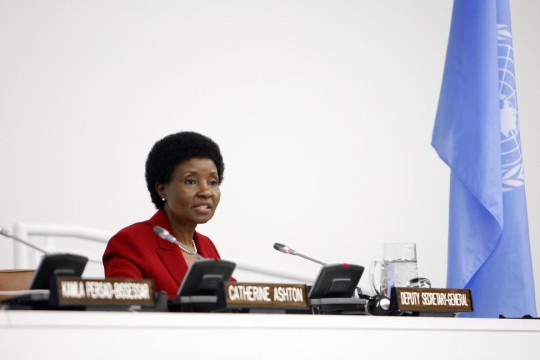UN officials urge eradication of sexual violence in Africa’s Great Lakes region
UN officials urge eradication of sexual violence in Africa’s Great Lakes region
 Deputy Secretary-General Asha-Rose Migiro. UN Photo/Rick Bajornas
Deputy Secretary-General Asha-Rose Migiro. UN Photo/Rick Bajornas
Deputy Secretary-General Asha-Rose Migiro today stressed that efforts to restore peace and stability in Africa’s Great Lakes region will not come to fruition unless the scourge of sexual violence is completely eradicated and justice systems are strengthened to end impunity.
“Sexual violence not only wreaks havoc in the lives of individual women and girls – it also causes lasting damage to the social fabric and economies of the Great Lakes region,” Ms. Migiro told the Fourth Ordinary Summit of the International Conference on the Great Lakes Region (ICGLR) in the Ugandan capital, Kampala.
“We see it in failed harvests, lost productivity, fractured families, protracted insecurity and reduced political participation,” she added, emphasizing the need for access to health, psychosocial and judicial services for survivors of sexual and gender-based violence. They must also be assisted to rebuild their lives, she said.By punishing the perpetrators, we can lift this burden of blame and shame from the backs of innocent victims.
Ms. Migiro urged heads of State and government gathered at the summit to ensure that the ICGLR’s Protocol on Prevention and Suppression of Sexual Violence against Women and Children, as well as the Protocol on Judicial Cooperation, are enshrined in national laws.
The Deputy Secretary-General said she was encouraged by the recommendations of ministers in charge of gender in the region, which cover key areas, including prosecuting perpetrators, supporting victims and strengthening national legal and financial capacities.
She pointed out that Secretary-General Ban Ki-moon is leading a UN system-wide effort to end violence against women, including domestic violence, harmful traditional practices and sexual violence as a tactic of war and terror. Those efforts include the UNiTE to End Violence against Women and Girls campaign launched in 2008.
Margot Wallström, the Secretary-General’s Special Representative on Sexual Violence in Conflict, urged leaders in the region to ensure that all relevant government departments – justice, defence, security, education and interior – and not just ministries in charge of gender and health – are engaged in the fight against sexual and gender-based violence.
“We have seen that rape can be a life sentence for the survivors,” said Ms. Wallström. “They are sanctioned socially and economically. Their freedom of movement, health and human dignity is denied.
“By punishing the perpetrators, we can lift this burden of blame and shame from the backs of innocent victims. Formal accountability, recognition and redress can make the difference between rape being a traumatic event, and rape being an event that permanently destroys lives and livelihoods.
“In short – this is everyone’s business – from gender experts to generals; from local police to regional and international peacekeepers. We must continually expand the circle of action.”
She said the UN stands ready to deploy a newly-constituted team of experts on the rule of law to assist governments affected by conflict to strengthen institutional safeguards against impunity. All national and regional early-warning mechanisms should also be attuned to the risk of impending, ongoing or escalating sexual violence to trigger rapid response, she added.
“To disarm the weapon of rape, we must recognize – once and for all – that it is not a ‘private’ issue to be silenced. It is a political and security issue that demands a political and security response,” said Ms. Wallström.
The ICGLR was set up in the wake of the 2002-2006 war in the Democratic Republic of the Congo (DRC) with the assistance of the African Union, UN and aid donors.
It is intended to facilitate the implementation of the Pact on Security, Stability and Development in the region signed in December 2006 by 11 heads of State and government – Angola, Burundi, Central African Republic (CAR), DRC, Kenya, Rwanda, Republic of Congo, Sudan, Uganda, Tanzania and Zambia.
While in Uganda, Ms. Wallström has held meetings with a series of senior Government officials from the region, including Tanzanian President Jakaya Mrisho Kikwete.
###
> United Nations (UN).
 The United Nations was established on 24 October 1945 by 51 countries committed to preserving peace through international cooperation and collective security. Today, nearly every nation in the world belongs to the UN: membership totals 192 countries.
The United Nations was established on 24 October 1945 by 51 countries committed to preserving peace through international cooperation and collective security. Today, nearly every nation in the world belongs to the UN: membership totals 192 countries.
When States become Members of the United Nations, they agree to accept the obligations of the UN Charter, an international treaty that sets out basic principles of international relations. According to the Charter, the UN has four purposes:
- to maintain international peace and security;
- to develop friendly relations among nations;
- to cooperate in solving international problems and in promoting respect for human rights;
- and to be a centre for harmonizing the actions of nations.
###
* The above story is adapted from materials provided by United Nations (UN)
** More information at United Nations (UN)



















